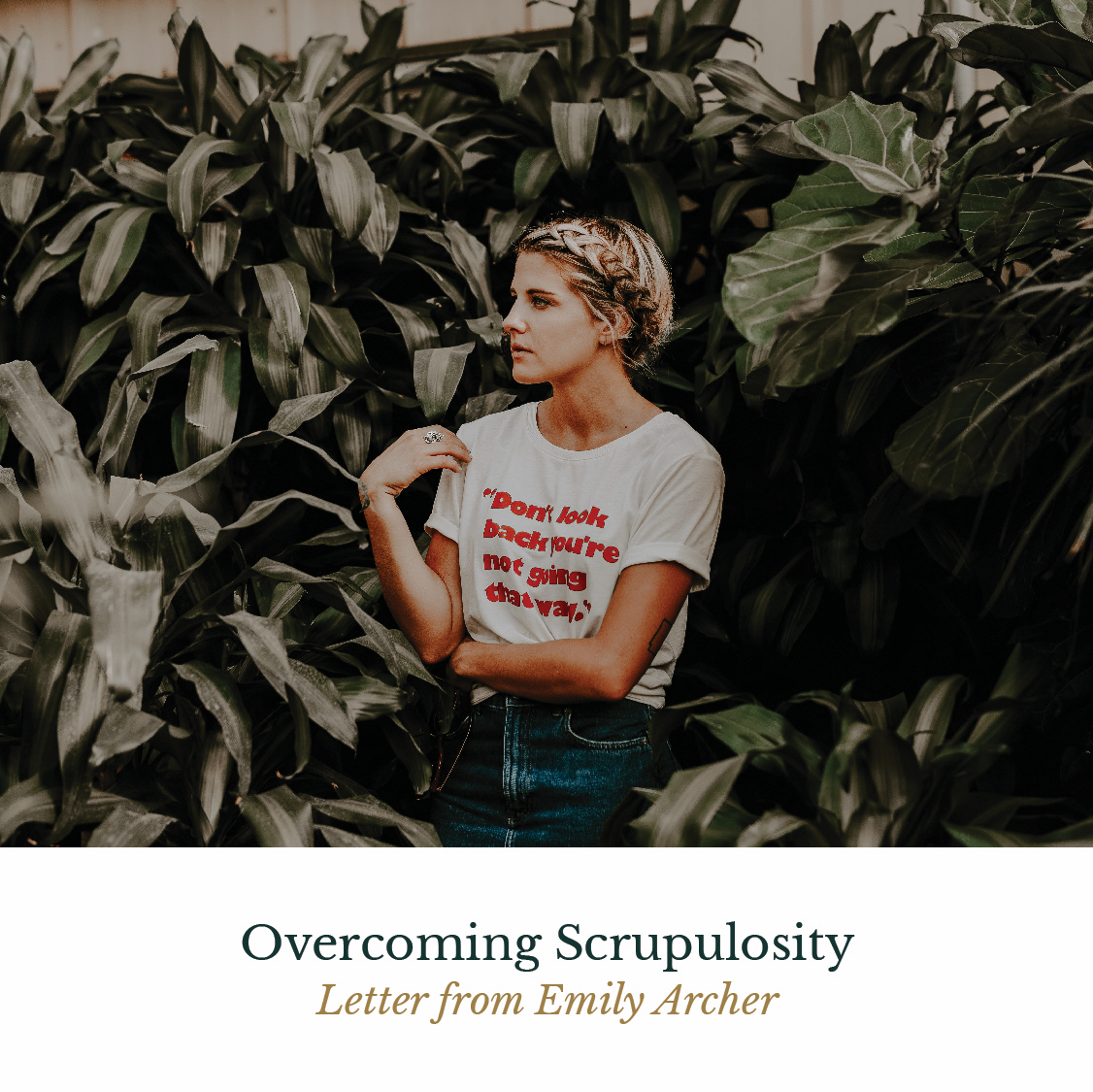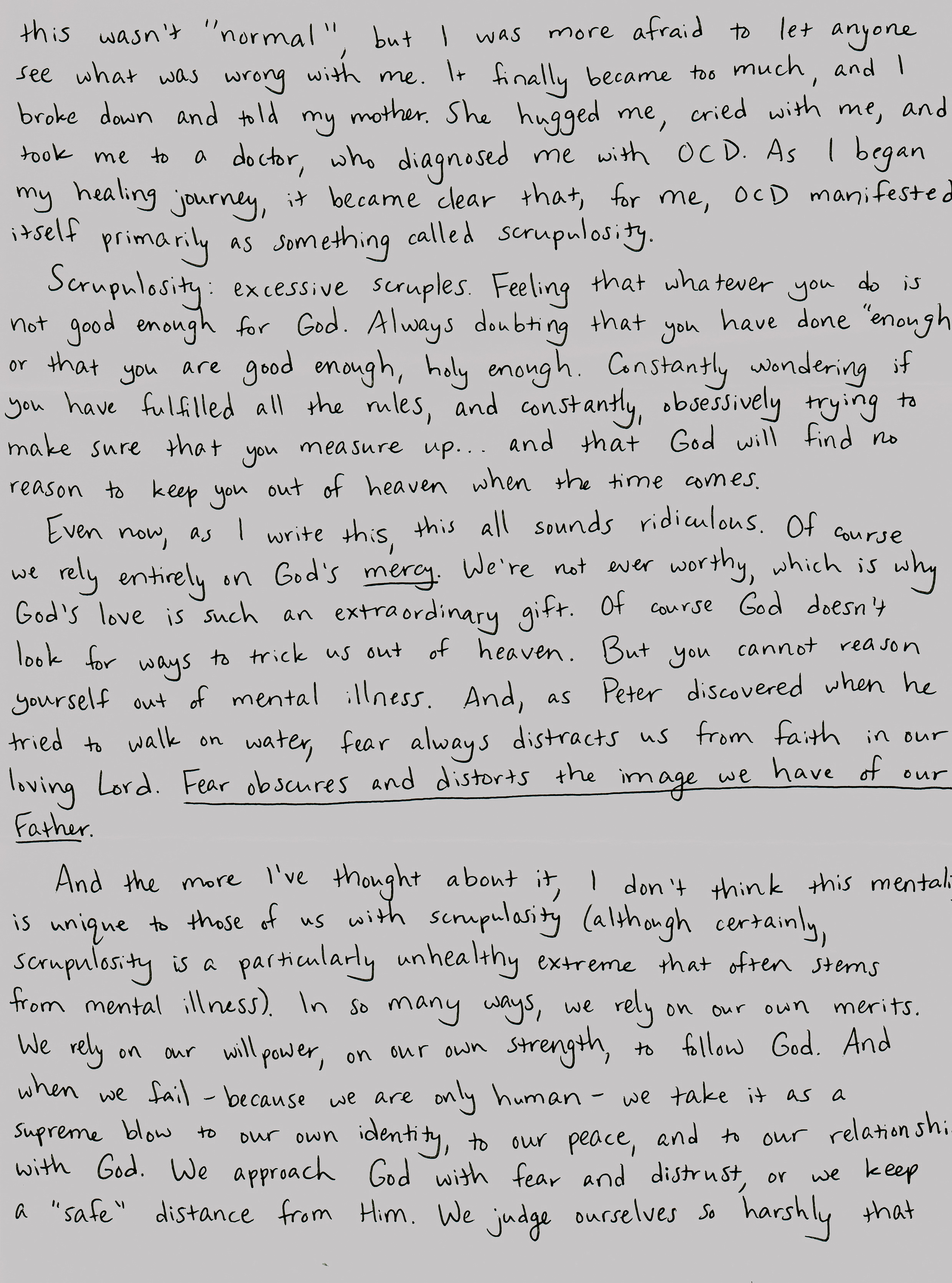Overcoming Scrupulosity
Letter from Emily Archer
(Click on the letters to enlarge)
Dear Sister,
I’m writing to you, my dear sister, with a message of hope and peace. I don’t know your story, but I know how isolating fear and anxiety can be.
I cannot remember a time before anxiety. When I was young, everything had to be just right, and I always had to be in control. As I grew older, the prevailing worry was homework - had I done it perfectly? What if I’d missed something? And then more diabolical fears crept in - and I do mean diabolical in the truest sense of the word. I spent years wrestling with crushing, exhausting, terrifying guilt in my spiritual life.
I don’t even know when this started, but I have a distinct memory from the summer I turned 12. I had gotten up in the middle of the night and convinced myself that I needed to pray a certain number of Hail Mary’s before I could lie down again. And the more I thought about it, the more prayers I convinced myself I needed to say. And of course, if I said anything imperfectly, it didn’t count. Eventually I was shaking and probably crying from fear, guilt, and the enormity and impossibility of the task I had trapped myself in. But I had promised God (or thought I had), and I knew how terrible it was to break a promise to God.
Even the smallest of decisions became fraught with the potential for mortal sin, and the agonizing stress of it all really did feel like a physical weight on my chest. I spent years worrying about and convicting myself of countless sins, terrified that any little thought or the smallest deed was enough to damn me to hell… and then desperately trying to claw my way back into a state of uneasy grace. Confession was nerve-wracking, and only briefly, if at all, comforting. I didn’t feel like I could confide in anyone, because I knew I would sound horribly sinful, crazy, or both. I was so ashamed, because I knew this wasn’t “normal”, but I was more afraid to let anyone see what was wrong with me. It finally became too much, and I broke down and told my mother. She hugged me, cried with me, and took me to a doctor, who diagnosed me with OCD. As I began my healing journey, it became clear that, for me, OCD manifested itself primarily as something called scrupulosity.
Scrupulosity: excessive scruples. Feeling that whatever you do is not good enough for God. Always doubting that you have done “enough” or that you are good enough, holy enough. Constantly wondering if you have fulfilled all the rules, and constantly, obsessively trying to make sure that you measure up… and that God will find no reason to keep you out of heaven when the time comes.
Even now, as I write this, this all sounds ridiculous. Of course we rely entirely on God’s mercy. We’re not ever worthy, which is why God’s love is such an extraordinary gift. Of course God doesn’t look for ways to trick us out of heaven. But you cannot reason yourself out of mental illness. And, as Peter discovered when he tried to walk on water, fear always distracts us from faith in our loving Lord. Fear obscures and distorts the image we have of our Father.
And the more I’ve thought about it, I don’t think this mentality is unique to those of us with scrupulosity (although certainly, scrupulosity is a particularly unhealthy extreme that often stems from mental illness). In so many ways, we rely on our own merits. We rely on our own willpower, on our own strength, to follow God. And when we fail - because we are only human - we take it as a supreme blow to our own identity, to our peace, and to our relationship with God. We approach God with fear and distrust, or we keep a “safe” distance from Him. We judge ourselves so harshly that we forget to remember that God’s mercy surrounds us always.
I would like to say that I’ve “gotten over” my scrupulosity, but that wouldn’t exactly be true. It comes and goes. For a while I was in therapy and on medication, which was such a blessing. And I do think this tendency to rely on my own moral strength - and to compulsively seek security in it - will always be with me. But I can now more easily recognize it for what it is, and try to reject it, with God’s grace. Even more than that, this struggle has given me such an overwhelming perspective of God’s grace and mercy that I otherwise would never have encountered. And for that I am so grateful. I don’t always feel God’s mercy, but I know now that that doesn’t make it any less real.
I write this for you, dear sister, and I write it for me, because there are still times when I need to remind myself: There was never a time and never will be a time when God looks at you with disdain and says, “That’s it, that was the last straw. I’ve had it with you. You should have learned by now.” Never! I’ll say it again, God will never say that. And when you struggle with trusting His goodness and mercy - whether it’s because of past wounds, mental illness, or anything else - God is suffering with you and for you. Because even more than you want His love, He wants for you to know His love. Your loving Father wants to take you in His arms and embrace you, to tell you that He sees you, He loves you, and He is with you. Even if all you feel is darkness, God loves you. We say that a lot — “God loves you” — and it’s easy to forget just how life-changing that is. The God of the Universe, the Creator of all, really and truly loves you - deeply, wildly, unconditionally, tenderly. God knows your hurt and your fears, and He wants to give you peace. He wants to welcome you into His beautiful love.
Jesus, I trust in You!
Love,
Emily
Want to share this quote with a friend? On your smart phone: press, save and share.
My name is Emily Archer. I’m 23 and about to graduate with my master’s degree in speech language pathology. Beyond that… I’m really not sure! I’ve been in Waco, Texas for the past 5 years, and I’ve loved it, but I’m feeling ready for something new. Long-term, I have dreams of becoming an accent coach and/or moving to Ireland one day – but I’m going to stick with speech therapy (in the U.S.) for the moment. I recently started my blog, Not Completely Mental, as a place to talk about the intersection of mental health and Catholic spirituality. I’m also a contributing writer for FemCatholic, which is a website dedicated to the “new feminism” that St. John Paul II called for. I have lots of plans for post-graduate life: learning new recipes, learning to sew, volunteering, offering NFP instruction, learning ASL, keeping up my German, relearning Spanish, reading all the books I haven’t had time for, rewatching Downton Abbey… and hopefully finding a job as well! As far as my vocation goes, this is going to sound super cliché and very vague, but I’m trying to learn to accept my identity in God’s love.
Read Related Letters













In this mini-documentary, Lauren shares how her relationship with the great female saints of the Catholic Church empowered her understanding of womanhood and inspired the creation of her business Brick House in the City.